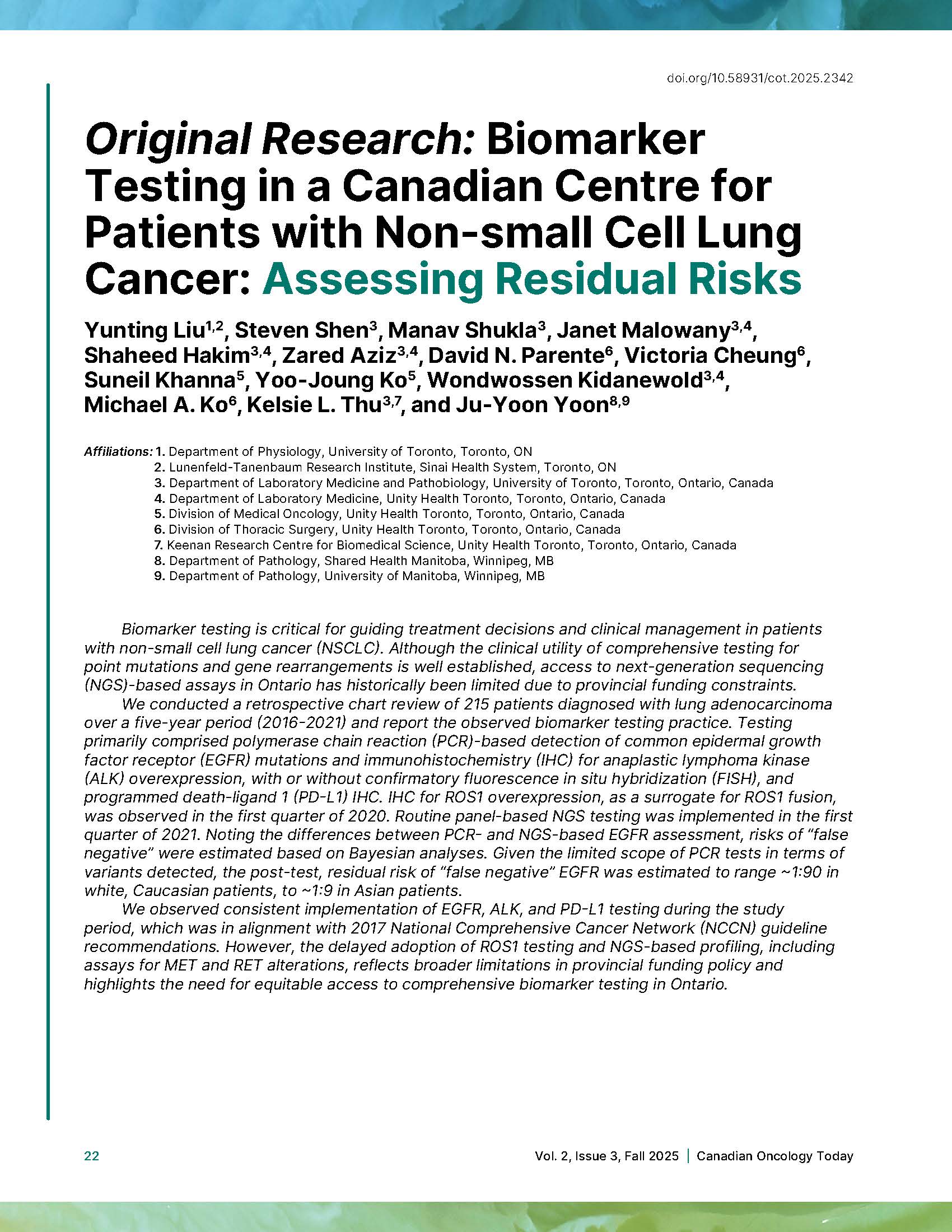Original Research: Biomarker Testing in a Canadian Centre for Patients with Non‑small Cell Lung Cancer: Assessing Residual Risks
DOI:
https://doi.org/10.58931/cot.2025.2342Abstract
Biomarker testing is critical for guiding treatment decisions and clinical management in patients with non-small cell lung cancer (NSCLC). Although the clinical utility of comprehensive testing for point mutations and gene rearrangements is well established, access to next-generation sequencing (NGS)‑based assays in Ontario has historically been limited due to provincial funding constraints.
We conducted a retrospective chart review of 215 patients diagnosed with lung adenocarcinoma over a five-year period (2016-2021) and report the observed biomarker testing practice. Testing primarily comprised polymerase chain reaction (PCR)-based detection of common epidermal growth factor receptor (EGFR) mutations and immunohistochemistry (IHC) for anaplastic lymphoma kinase (ALK) overexpression, with or without confirmatory fluorescence in situ hybridization (FISH), and programmed death-ligand 1 (PD-L1) IHC. IHC for ROS1 overexpression, as a surrogate for ROS1 fusion, was observed in the first quarter of 2020. Routine panel-based NGS testing was implemented in the first quarter of 2021. Noting the differences between PCR- and NGS-based EGFR assessment, risks of “false negative” were estimated based on Bayesian analyses. Given the limited scope of PCR tests in terms of variants detected, the post-test, residual risk of “false negative” EGFR was estimated to range ~1:90 in white, Caucasian patients, to ~1:9 in Asian patients.
We observed consistent implementation of EGFR, ALK, and PD-L1 testing during the study period, which was in alignment with 2017 National Comprehensive Cancer Network (NCCN) guideline recommendations. However, the delayed adoption of ROS1 testing and NGS-based profiling, including assays for MET and RET alterations, reflects broader limitations in provincial funding policy and highlights the need for equitable access to comprehensive biomarker testing in Ontario.
References
Riely GJ, Wood DE, Ettinger DS, Aisner DL, Akerley W, Bauman JR, et al. Non-Small Cell Lung Cancer, Version 4.2024, NCCN Clinical Practice Guidelines in Oncology. J Natl Compr Canc Netw. 2024;22(4):249-74.
Ettinger DS, Wood DE, Aisner DL, Akerley W, Bauman J, Chirieac LR, et al. Non-Small Cell Lung Cancer, Version 5.2017, NCCN Clinical Practice Guidelines in Oncology. J Natl Compr Canc Netw. 2017;15(4):504-35.
Hirsch FR, Bunn PA, Jr. EGFR testing in lung cancer is ready for prime time. Lancet Oncol. 2009;10(5):432-3.
Ogino S, Wilson RB. Bayesian analysis and risk assessment in genetic counseling and testing. J Mol Diagn. 2004;6(1):1-9.
Ogino S, Wilson RB. Genetic testing and risk assessment for spinal muscular atrophy (SMA). Human Genetics. 2002;111(6):477-500.
Yoon J-Y, Rosenbaum JN, Vergara N, Cohen RB, Wilson RB. Bayesian approach to interpreting somatic cancer sequencing data: a case in point. Journal of clinical pathology. 2020.
Reinersman JM, Johnson ML, Riely GJ, Chitale DA, Nicastri AD, Soff GA, et al. Frequency of EGFR and KRAS mutations in lung adenocarcinomas in African Americans. J Thorac Oncol. 2011;6(1):28-31.
Cote ML, Haddad R, Edwards DJ, Atikukke G, Gadgeel S, Soubani AO, et al. Frequency and type of epidermal growth factor receptor mutations in African Americans with non-small cell lung cancer. J Thorac Oncol. 2011;6(3):627-30.
Riely GJ, Politi KA, Miller VA, Pao W. Update on epidermal growth factor receptor mutations in non-small cell lung cancer. Clin Cancer Res. 2006;12(24):7232-41.
Kwak EL, Bang YJ, Camidge DR, Shaw AT, Solomon B, Maki RG. Anaplastic lymphoma kinase inhibition in non-small-cell lung cancer. N Engl J Med. 2010;363.
Rosenbaum JN, Bloom R, Forys JT, Hiken J, Armstrong JR, Branson J, et al. Genomic heterogeneity of ALK fusion breakpoints in non-small-cell lung cancer. Mod Pathol. 2018;31(5):791-808.
Wynes MW, Sholl LM, Dietel M, Schuuring E, Tsao MS, Yatabe Y, et al. An international interpretation study using the ALK IHC antibody D5F3 and a sensitive detection kit demonstrates high concordance between ALK IHC and ALK FISH and between evaluators. J Thorac Oncol. 2014;9(5):631-8.
Dugay F, Llamas-Gutierrez F, Gournay M, Medane S, Mazet F, Chiforeanu DC, et al. Clinicopathological characteristics of ROS1- and RET-rearranged NSCLC in caucasian patients: Data from a cohort of 713 non-squamous NSCLC lacking KRAS/EGFR/HER2/BRAF/PIK3CA/ALK alterations. Oncotarget. 2017;8(32):53336-51.
Kim HR, Lim SM, Kim HJ, Hwang SK, Park JK, Shin E, et al. The frequency and impact of ROS1 rearrangement on clinical outcomes in never smokers with lung adenocarcinoma. Ann Oncol. 2013;24(9):2364-70.
Champagnac A, Bringuier PP, Barritault M, Isaac S, Watkin E, Forest F, et al. Frequency of MET exon 14 skipping mutations in non-small cell lung cancer according to technical approach in routine diagnosis: results from a real-life cohort of 2,369 patients. J Thorac Dis. 2020;12(5):2172-8.
Awad MM, Oxnard GR, Jackman DM, Savukoski DO, Hall D, Shivdasani P, et al. MET Exon 14 Mutations in Non-Small-Cell Lung Cancer Are Associated With Advanced Age and Stage-Dependent MET Genomic Amplification and c-Met Overexpression. Journal of clinical oncology : official journal of the American Society of Clinical Oncology. 2016;34(7):721-30.
Wang R, Hu H, Pan Y, Li Y, Ye T, Li C, et al. RET Fusions Define a Unique Molecular and Clinicopathologic Subtype of Non–Small-Cell Lung Cancer. Journal of Clinical Oncology. 2012;30(35):4352-9.
Asano H, Toyooka S, Tokumo M, Ichimura K, Aoe K, Ito S, et al. Detection of EGFR gene mutation in lung cancer by mutant-enriched polymerase chain reaction assay. Clin Cancer Res. 2006;12(1):43-8.
Wang X, Gao Y, Wang B, Zhang Z, Liang C, Feng H, et al. Analytic and Clinical Validation of an Ultrasensitive, Quantitative Polymerase Chain Reaction Assay for EGFR Mutation Analysis With Circulating Tumor DNA. Archives of Pathology & Laboratory Medicine. 2017;141(7):978-84.
Collisson EA, Campbell JD, Brooks AN, Berger AH, Lee W, Chmielecki J, et al. Comprehensive molecular profiling of lung adenocarcinoma. Nature. 2014;511(7511):543-50.

Published
How to Cite
Issue
Section
License
Copyright (c) 2025 Canadian Oncology Today

This work is licensed under a Creative Commons Attribution-NonCommercial-NoDerivatives 4.0 International License.
